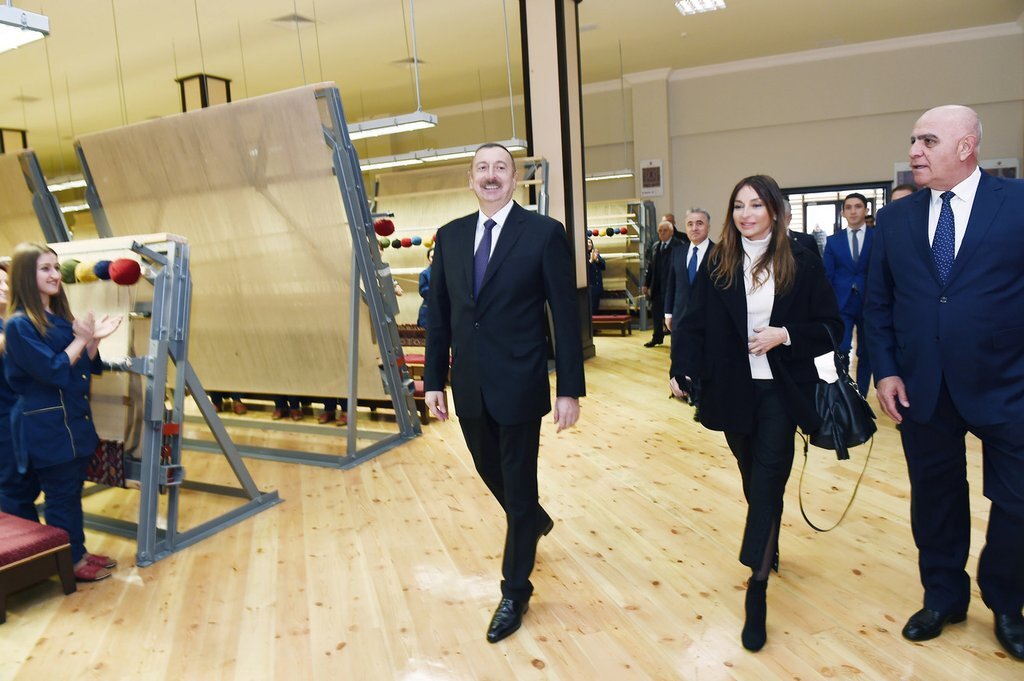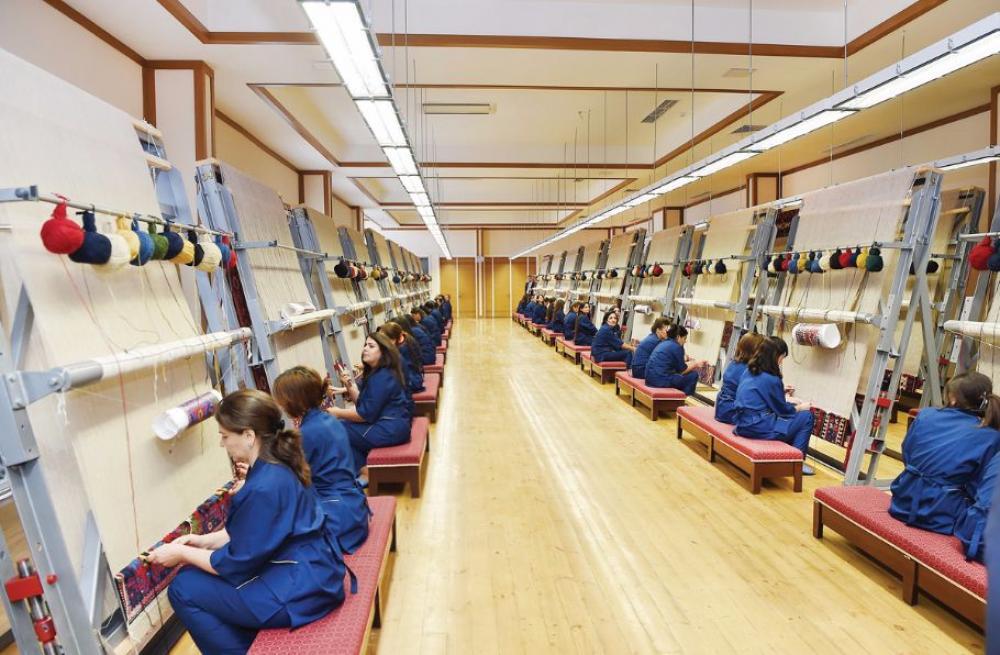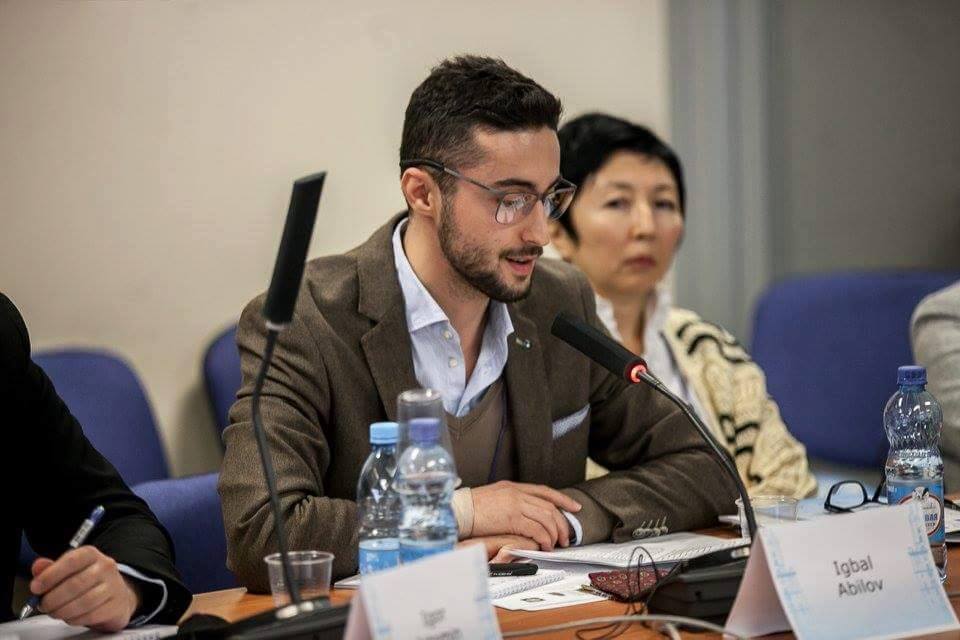Workers at Azerbaijani state carpet production company Azerkhalcha (‘Azerbaijani carpet’) have said they have not received their salaries for almost half a year.
Over a dozen former and current employees from branches throughout the country confirmed to OC Media that they had either been paid irregularly or not at all since February.
The company put it’s workers on temporary leave at the end of March after the COVID-19 pandemic hit Azerbaijan.
Azerkhalcha is an open joint-stock company created in 2016 by the decree of Azerbaijani President Ilham Aliyev. Since then, Aliyev has attended the opening ceremonies of almost all of the company’s new branches and personally appointed Vidadi Muradov as the head of the company in June 2016.

Azerkhalcha has also been highlighted as an important part of the State Plan for 2018–2022 as an enterprise developing the non-oil sector of Azerbaijan’s economy.
According to the BBC’s Azerbaijani service, Azerkhalcha employes roughly 1,800 people throughout the country, 1,500 as carpet weavers.
Despite reportedly not paying its employees, Azerkhalcha has opened two new branches since February — in Kurdamir and Tartar, both in central Azerbaijan.
‘The workers are not paid in all the branches’
One worker at Azerkhalcha’s Gazakh branch told OC Media that they, along with others from the Gazakh, Agstafa, and Tovuz branches in northwestern Azerbaijan, had not been paid at all since the COVID-19 pandemic began.
‘We are struggling, we have loans to be paid, we have to buy food, pay for utilities, electricity, gas, water, telephone, internet, everyone wants money. We are in a very bad situation’, he said.
A former worker at the Shamkir branch who quit her job in May said that she is waiting to receive the money she is owed.
‘We were unable to receive the ₼190 ($110) which government gives as support for unemployed people [during the pandemic] because we all have work contracts,’ she said.
She said that despite receiving some money in March, it was far lower than her usual salary. ‘We received money for March, but it even didn't make ₼100 ($60)’.
A former employee of the Goranboy branch who also quit at the end of May told OC Media that the problem existed in all of the company’s branches.
‘I spoke with workers at all the branches. I even talked to the workers of the newly opened Tartar branch. They’re also not receiving salaries.’
‘We received [a part of] our salaries twice. The first time was for March, the second time we don’t know exactly for which month they paid us. But still, workers received only ₼20–₼100 ($12–$60). I received ₼100 ($60)’, he said.
‘They are just telling us fairy tales — both [company head Vidadi Muradov and chief spokesperson Tural Safarov]. They said “don’t worry, my dear, the payment will be transferred”, but three months have already passed. They said that the Minister of Economy should transfer money’, he concluded.
Mirvari Gahramanli, a veteran labour rights activist and head of the Oil Workers Rights Protection Organisation, told OC Media that by law employees’ salaries must be paid immediately.
‘For the salaries delayed from March, according to labour legislation, if payment is delayed due to the fault of the employer and this does not lead to an individual labour dispute, the employee must be paid at least 1% of their salary for each day it is delayed [on top of their salary]’.
She noted that employees must apply to the court in this regard.
‘For the period after March, that is, when employees were sent on leave [because of the pandemic], they must be paid 70% of their monthly salary’, she said.
‘In both cases, the employees' labour rights were violated by their employer’, Gahramanli concluded.
‘Government financial help will come in days’
Tural Safarov, the chief spokesperson of Azerkhalcha, told OC Media that he expected the employes to be paid what they are owed within days.
‘We paid them for March, and now they have to be paid only for February and other periods of idle work [when they were on leave],’ Safarov said.
‘We don’t fire our workers in this difficult time. We will pay them two-thirds of their salaries for [each month of] idle work,’ he added.
He claimed the company had paid workers 45% of their salaries for April when money came from the government ‘as support for businesses suffering from COVID-19’.
‘We have addressed certain government bodies — the Cabinet of Ministers, Ministry of Economy, and Ministry of Finance. Providing us money in the short term is being considered, we are expecting to receive money by the end of this month’, he said.
‘The finances will arrive in the coming days, and after that, we will pay our workers two-thirds of their salaries until this situation continues’, he said.
Several employees told OC Media they were sceptical about the company’s promises.
‘We only received some money in June. They say they will pay us soon, they come up with different excuses, but there is no concrete decision about this’, one employee of the Sumgayit branch told OC Media.
Neither the Cabinet of Ministers nor the ministries of economy or finance responded to a request for comment from OC Media.
The Azerbaijani Coronavirus Respond Fund created by president Aliyev in March was aimed to financially support businesses suffering from the consequences of COVID-19. As of 29 July, the Fund had raised nearly ₼114 million ($60 million).
[Read more on Coronavirus Respond Fund in Arzu Geybulla’s opinion: Opinion | Azerbaijan’s COVID-19 response: anything but adequate]
Safarov said that the delay in salary payment was due to COVID-19.
‘Now, in the period of the pandemic around the world, relations between countries are limited and demand for carpets and carpet products on the global market has decreased. We have faced specific problems in selling carpets’, he said.
‘The distance between workers in our branches is 30 centimetres which is contrary to pandemic rules. That’s the reason why we closed our branches’, he said. He added that border closures also meant they have no raw materials.
Talking about newly opened branches of Azerkhalcha, Safarov said that ‘they wrote it incorrectly there’, referring to their own website.
‘Kurdamir and Tartar branches have been operating since the end of 2018 [...] the President just got acquainted with the work of these facilities. We just presented it like an opening’, he said.




 30 July 2020
30 July 2020



